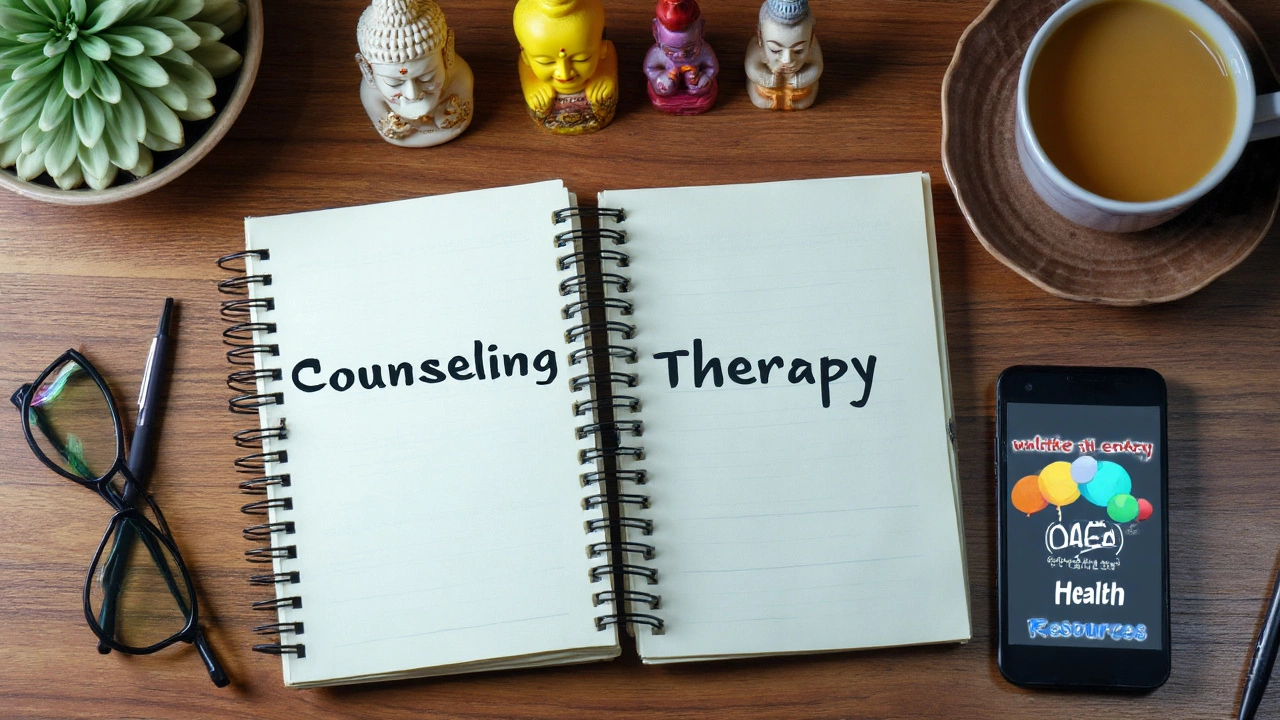Ever wondered if there's any real difference between counseling and therapy? People toss around both words as if they mean the same thing. Actually, there are some real distinctions—and no, it’s not just about who sits in the comfy chair. If you’ve ever felt lost figuring out which support you need, you’re definitely not alone. Here’s the lowdown on what each offers, how they overlap, and which might fit best for what you’re dealing with.
Defining Counseling: What's on Offer?
Counseling usually focuses on specific issues or situations. It's the helping hand you reach for when life throws you a nasty surprise—think of breakups, career challenges, or stress from sudden changes. But don’t picture Freud’s couch here. Most counselors take a practical, solution-focused approach. They help you talk things through, spot patterns, and come up with strategies you can actually use. It’s about guidance more than diagnosis. Counseling often has a timeline too. Many programs, especially in schools or workplace settings, last a set number of weeks or sessions. And here's something you might not know: certified counselors sometimes don’t have doctorates, but they do have at least a master's degree and state or national credentials. Common fields are family counseling, academic counseling, and substance abuse counseling.
For instance, if you’re struggling with grief or workplace stress, counseling usually deals with the here and now. Techniques are practical—problem-solving, goal-setting, or skill-building. Ever heard of motivational interviewing? That’s a favorite in counseling, designed to help you talk yourself into positive changes. And, no, counseling isn’t a lifelong commitment. Many people use it during challenging phases and may not return for years, unless another new issue pops up. In short, counseling is like a pit-stop, meant to get you tuned and running again.
Digging Into Therapy: Looking Below the Surface
Therapy, or psychotherapy, dives much deeper than counseling. It's the process you turn to when you want to dig through the roots of ongoing or complex emotional and mental health issues. Therapy doesn’t set the timer the way counseling often does. Therapeutic relationships can last months or even years, depending on your needs and goals. Therapists have more advanced training—usually a doctorate or a master’s with special clinical licensing. They use research-backed techniques like cognitive-behavioral therapy (CBT), dialectical behavioral therapy (DBT), and psychoanalysis.
This field is about addressing underlying patterns. Instead of just tackling your fight with your boss, therapy might explore why you have trouble with authority figures at all. Are past experiences shaping current behavior? Are there recurring thought patterns that hold you back? Therapy is also where people go for diagnosing and treating mental health disorders—generalized anxiety, depression, or post-traumatic stress disorder. If you want to get familiar with stats: according to a 2022 report by the National Institute of Mental Health, 41.7 million adults in the US received some form of therapy or counseling in the past year, and therapy was used in about two-thirds of those cases, especially for anxiety and depressive disorders.
Lately, you’ll find therapies that are specialized for trauma (like EMDR), relationships, or even eating disorders. Some therapists weave counseling techniques into their style—goal-setting, for example—but the work usually runs deeper. No quick fixes here; therapy is about long-term change and often healing from the inside out.

Comparing Counseling and Therapy: Myths, Facts, and When to Pick Each
The lines between counseling and therapy blur sometimes, especially since both support mental health. But making the right choice can save you time, money, and stress. Here’s a simple side-by-side to clear things up:
| Aspect | Counseling | Therapy |
|---|---|---|
| Focus | Specific challenges (situational) | Deeper issues and patterns (long-term) |
| Duration | Usually short-term or with a set limit | Often long-term or open-ended |
| Credentials | Master’s level, certified | Master’s or doctoral, clinically licensed |
| Methods | Solution-focused, skills-based | Insight-oriented, evidence-based therapies |
| Common Uses | Career, school, grief, relationships, stress | Anxiety, depression, trauma, eating disorders |
The big myth? That counseling is “less serious” than therapy. Not true—they just serve different needs. If you want to ventilate about a recent argument with your partner, counseling might be enough. If you’re replaying old hurts from your teen years, therapy is probably your better fit. Don’t fall for the myth that only therapy “counts” if you have deep pain or that counseling is just for minor problems.
What about overlap? Some counselors practice therapy, and some therapists use counseling methods. Laws on who can call themselves what vary by country and even state. But, if you’re not sure which to try, look at your goals: Want guidance on specific decisions? Counseling fits. Long-standing patterns holding you back? That’s where therapy shines.
Tips for Choosing the Right Mental Health Support
Searching for help is brave, so don’t sweat the labels too much. But knowing the difference can help you land the right fit faster. Here’s what to consider when browsing options:
- Identify your goals: Is your struggle connected to something recent or is it a feeling that won’t quit? Short-term problem—counseling. Long-term or repetitive cycles—therapy.
- Check credentials: Both counselors and therapists need to be licensed but the requirements differ. Double-check who you’re talking to. In the US, titles like LPC (Licensed Professional Counselor) or LMFT (Licensed Marriage and Family Therapist) are for counseling. Psychologists, clinical social workers, and psychiatrists cover the therapy side, and only psychiatrists can prescribe meds.
- Cost and access: Therapy often costs more because of longer sessions or frequency. Some counselors work in schools or clinics for free or low-cost. Double-check what your insurance here covers before you commit.
- No harm in switching: Tried counseling and feel it’s not enough? Step up to therapy. No shame in shopping around for the right style or professional—most people don’t find their match on the first try.
- Virtual options are real: Online counseling and therapy have exploded, especially since 2020. Apps like BetterHelp and Talkspace offer both, and user satisfaction is up. In-person isn’t always better—some people open up more behind a screen.
Nearly 60% of people seeking help for mental wellness will switch between professionals before finding the right fit, according to a survey by the American Psychological Association from 2023. So don’t stress if your path isn’t straightforward.

Why the Difference Matters for Mental Wellness
Mental health is something we all have to manage, just like physical health. Recent numbers from the World Health Organization show that around 1 in 8 people globally live with a mental health condition. Yet, almost twice as many never seek help, often out of confusion or worry about “doing it wrong.” Understanding the counseling vs therapy debate helps people get help sooner—and that’s what prevents problems from becoming crises.
If you or someone you know is stuck, the key is not to freeze waiting for the “perfect answer.” Some people start with counseling only to realize they need therapy, while others go the other way around. Still, both paths lead to a stronger self with the right guide. Even big names like Michael Phelps and Lady Gaga have openly talked about their therapy journeys, breaking stigma wide open. If top athletes and artists can seek help and thrive, that’s a green flag for anyone else.
The difference between counseling and therapy isn’t about which is better, but about what fits. It’s not just about curing problems—both can help boost self-awareness, sharpen your life skills, and get you connected with people who understand. At the end of the day, the trick isn’t just starting, but sticking with the support that works for you.





